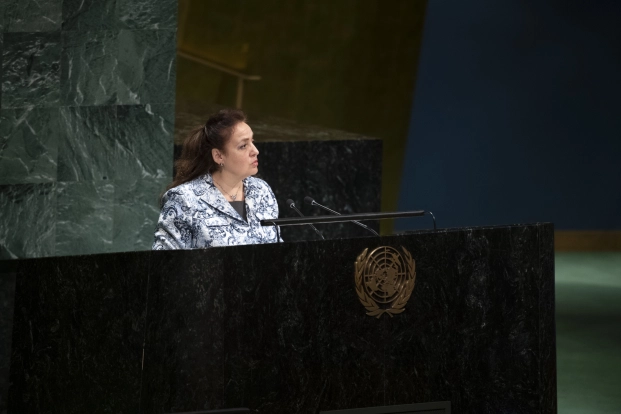
H.E. Mrs. Isabelle Picco's call to action to safeguard oceans and biodiversity
Published on 10 December 2019 at 12:00 - Modified the 25 July 2023 at 03:03
Statement by H.E. Mrs Isabelle PICCO, Ambassador, Permanent Representative of Monaco to the United Nations
Mr President,
My delegation wishes, first of all, to express its thanks to the Secretary-General and the Division for Ocean Affairs and the Law of the Sea for the report on oceans and the law of the sea, very synthetic and of high quality.
Allow me to pay special tribute to the Director, Ms. Gabrielle Goettsche-Wanli, for her known and appreciated skills and dedication in leading the Division.
Mr President,
Since the last consideration of this agenda item by the General Assembly, we have seen strengthened political attention around the link between the ocean, climate and biodiversity.
According to the report of the Intergovernmental Platform on Biodiversity and Ecosystem Services (IPBES), "biodiversity is becoming poorer than ever in the history of humankind".
This alarming find is complemented by the Intergovernmental Panel on Climate Change (IPCC) and the World Meteorological Organization (WMO) on the impacts of climate change.
The IPCC Special Report on the Ocean and the Cryosphere, approved last September in Monaco, provides a compelling picture of the observed and anticipated disastrous effects of climate change on the oceans and seas.
In this respect, we regret that the conclusions of the report were not better reflected in the draft resolutions, these conclusions being unquestionable and constituting the most recent scientific information.
Indeed, the physical and chemical changes affecting the ocean have a wide range of consequences for marine ecosystems, marine biodiversity and human populations, particularly the most vulnerable living near the coast, in developing countries and in the developing world, SIDS in particular.
The questions we are facing are as follows: how will we deal with the reduction of the global cryosphere and the melting of ice, the ocean acidification and deoxygenation, and the changing distribution of the species and impacts on global marine biomass?
The cost of inaction will be felt all the more because we are refusing to measure the consequences. Still, we know that ambitious nationally determined contributions and reductions in greenhouse gas emissions are the prerequisites for a sustainable future.
Even in a 1.5 ° C temperature rise scenario, 80% of the corals would be threatened. Very serious socio-economic impacts, particularly for local and artisanal fisheries and for sustainable tourism, seem inevitable.
In addition, 680 million people live in coastal areas today. However, rising sea levels are going to accelerate and will require huge infrastructure investments and real security challenges in the coming decades.
Every year, we witness extreme weather events and natural disasters that threaten the resilience of coastal areas.
Mr President,
The time to say that these events are alarming has passed.
The time to say that it is urgent to act has passed. It's now time for action.
It is now urgent to implement the commitments we've been making for several years, including the 2030 program and SAMOA guidelines.
It is in this context that the Lisbon Conference will be held next June to support the implementation of SDG 14, for which four targets are due to expire.
Just prior to the United Nations Decade of Ocean Sciences for Sustainable Development (2021-2030), the theme of the Lisbon Conference encourages us to pay the utmost attention to the intensification of action based on science, technology and innovation.
We support the efforts of the Intergovernmental Oceanographic Commission of UNESCO for the preparation of this Decade.
Mr President,
The development of an Agreement to Implement the United Nations Convention on the Law of the Sea for the Conservation and Sustainable Use of Marine Biodiversity beyond Areas of National Jurisdiction also constitutes a particularly important development of the international law of the sea. We hereby reaffirm our commitment to move towards the conclusion of an ambitious agreement as soon as possible.
Mr President,
Like many others, we strongly believe that the ocean must be an integral part of the response we provide at all levels in the context of climate action.
The Principality of Monaco has thus pledged to double its efforts to achieve its objective of reducing by 50% its greenhouse gas emissions in 2030 compared to 1990, in an effort to reach carbon neutrality by 2050.
Increasing the share of renewable energies is one of the pillars of our energy transition plan.
The development of thalassothermy can recover the heat energy of the sea to heat and cool many buildings.
In addition, a prototype developed by a Monegasque company to convert wave energy will be deployed in 2021 for a test period.
The Principality of Monaco also intends to continue to play its part at the local, regional and international levels.
As an example of this spirit of cooperation, the PELAGOS Agreement between France, Italy and Monaco, on the creation of a Marine Mammal Sanctuary celebrated its 20th anniversary this year.
A better understanding of our immediate environment, the Mediterranean Sea, is one of the issues that Monaco attaches great importance to.
For example, Monaco supports the Sphyrna Odyssey mission, which is currently studying the behavior of deep-diving cetaceans, including sperm whales, cactus whales and risso dolphins, using autonomous laboratory vessels. This mission focuses on the movements of these species and noise pollution due to human activities.
Internationally, the Principality supports science and cooperation through the "Explorations of Monaco". Through scientific missions in all regions of the world, these "Explorations" promote research, protection of megafauna, protection of corals, new exploration technologies and the development of marine protected areas.
The commitment to "reconcile humanity and the sea" carried by His Serene Highness Prince Albert II and supported by all Monegasque entities is now more important than ever.